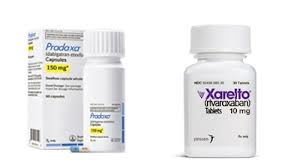Strange how less than 4 weeks ago seems like an eon, but less than a month ago, I pointed out a meta-analysis of randomized controlled trials published in the Archives of Internal Medicine in which the authors concluded that use of new oral anticoagulants (NOAC) such as dabigatran & rivaroxaban was associated with increase risk of bleeding in acute coronary syndrome when administered w/concomitant anti-platelet agents. But what does that mean to the rest of us who are not in the throes of a heart attack?
In a systematic review of 6 randomized controlled trials published in the Annals of Internal Medicine last week, outcomes were compared in patients who'd been previously randomized to either warfarin or an NOAC, everything else being equal, for either venous thromboembolism or for stroke prevention in atrial fibrillation. NOACs were associated w/lower all-cause mortality in atrial fibrillation whereas there was no improvement to be made in those w/venous thromboembolism. More importantly, NOAC use was not associated w/gastrointestinal bleeding, major bleeding and/or fatal bleeding, in direct contrast to last month's post.
But let's not forget that a different demographic was studied, one that was risky, but less so perhaps. So here we are in a brave new world of anticoagulation. Everyone has a different idea of how to interpret the data set before him/her. Know the risks & benefits. And make sure the conclusions are based upon a group similar to you.
Tweet



No comments:
Post a Comment